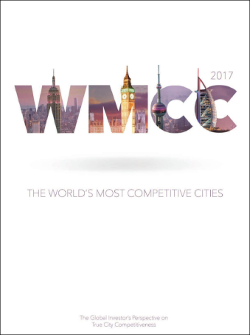Ungated Post | 31 May 2017
The World’s Most Competitive Cities

Oxford Economics’ custom research was recently featured in the third edition of the World’s Most Competitive Cities (published by Conway). The report examines the economic fundamentals supporting direct foreign investment projects in the world’s most competitive cities. Oxford’s leading location strategist Dan Levine provided cutting-edge insights into emerging industries and metros, drawing on Oxford Economics’ best-in-class regional research and forecasts.
Oxford Economics insights span the globe, assessing a wide array of cities, each facing unique economic opportunities and challenges. In Berlin, for example, Levine cites the 44,000 new companies launching in the city annually, the highly-educated workforce, and the fast-growing information and communication sector (page 18). In Abu Dhabi, Levine assesses economic prospects in response to low global oil prices and the city’s effort to attract manufacturing (page 32). In São Paulo, Levine dissects the downward pressure on the country’s and city’s economies and notes the resulting cost advantages for companies seeking to establish a Latin American regional headquarters (page 38). In addition, Levine also assesses the competitive advantages of cities like Barcelona (page 44), Nairobi (page 66), Prague (page 72), Dublin (page 96), London (page 106), and Lagos (page 110).
The world most competitive cities are almost always the economic engines driving growth in their respective national economies. Let Oxford Economics put these insights to work for you.
Click here to read the full report.
To find out more about our capabilities, contact:
Dan Levine
Practice Leader, Location Strategies
+1 646 503 3067
Email
Hamilton Galloway
Head of Consultancy, Americas
+1 (646) 503 3068
Email
Related Services

Post
The economic impact of abandoning the WTO
Oxford Economics have been commissioned by the International Chamber of Commerce (ICC) to provide an independent assessment of the economic impact of WTO dissolution. This report details our findings and the assumptions underpinning our analysis.
Find Out More
Post
The economic impact of the sports activities of public service media
This study shows how the sports activities of public service media supported €4.5 billion of GDP and 57,000 jobs across 31 European countries in 2022. The report also highlights wider economic benefits of public service media sports coverage, such as the way in which it leverages sponsorship income for sports bodies.
Find Out More
Post
Global Trade Education: The role of private philanthropy
Global trade can amplify economic development and poverty alleviation. Capable leaders are required to put in place enabling conditions for trade, but currently these skills are underprovided in developing countries. For philanthropists, investing in trade leadership talent through graduate-level scholarships is an opportunity to make meaningful contributions that can multiply and sustain global economic development.
Find Out More